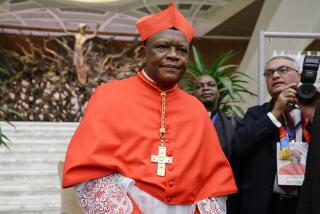Church Group Urges S. Africa Sanctions
- Share via
HARARE, Zimbabwe — A special World Council of Churches conference on South Africa ended Friday with a declaration that apartheid is “against God’s will” and a call for economic sanctions against South Africa and support for its black nationalist groups.
In a final statement entitled The Harare Declaration, the 88 delegates to the three-day meeting also urged an international ban on loans to the white-minority government and to South Africa’s companies and financial institutions to protest the country’s racial policies.
The declaration called for a world day of prayer next June 16--the 10th anniversary of the 1976 riots in the huge black township of Soweto outside Johannesburg--”to end unjust rule in South Africa,” and for implementation of a U.N. resolution urging South Africa to grant independence to Namibia (South-West Africa).
The declaration followed several hours of discussions among delegates, some of whom warned against support for economic sanctions.
‘Moment of Truth’
But the conference said that “the moment of truth is now for South Africa and the world community” and called South Africa’s policy of apartheid, or racial segregation, “against God’s will.”
“We understand fully and support those in South Africa calling for the resignation of the government,” the declaration stated. “We regard this as the most appropriate and least costly process of change as we await a new democratic representative government in South Africa.”
The declaration urged churches in South Africa and elsewhere “to support South African movements working for the liberation of their country.”
The World Council of Churches has been a foe of apartheid since its founding in 1948 and its “Program to Combat Racism” has funneled hundreds of thousands of dollars into anti-apartheid groups.
Tutu Defies Policy
During the conference, 37 South African churchmen, including Anglican Bishop Desmond Tutu, the 1984 Nobel Peace laureate, met leaders of two South African black nationalist movements--the outlawed African National Congress and the Pan-Africanist Congress--in defiance of South African government policy.
Emilio Castro of Uruguay, general secretary of the World Council of Churches, called the emergency meeting of the Geneva-based ecumenical organization--made up of more than 300 Protestant and Orthodox Christian denominations in 100 countries--after a September visit by the Rev. C.F. Beyers Naude, general secretary of the South African Council of Churches and a leading opponent of apartheid.
Thirteen U.S. church officials, including several bishops and presidents of denominations, attended the meeting.
More to Read
Sign up for Essential California
The most important California stories and recommendations in your inbox every morning.
You may occasionally receive promotional content from the Los Angeles Times.













